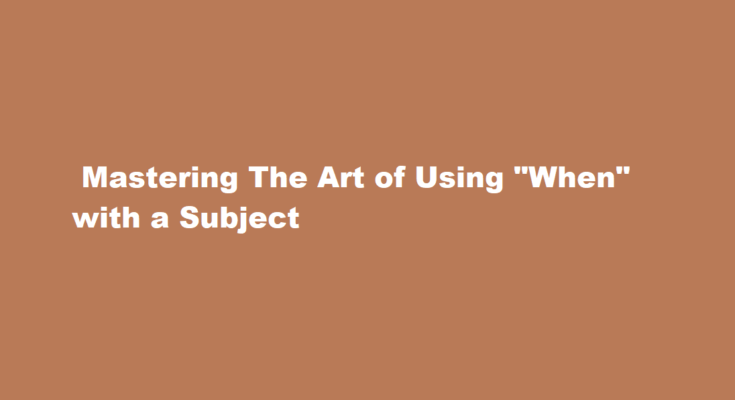Introduction
When it comes to constructing clear and concise sentences, the proper use of grammar is crucial. One particular area that often causes confusion is the usage of the word “when” with a subject. Understanding how to effectively combine “when” with a subject can enhance the clarity and coherence of your writing. In this article, we will explore the rules and guidelines for using “when” with a subject, providing you with valuable insights to strengthen your language skills.
Defining “When” as a Conjunction
The word “when” primarily functions as a conjunction, connecting two clauses or ideas within a sentence. It indicates a specific time or condition that triggers an action or event. When used with a subject, “when” acts as a subordinating conjunction, linking a dependent clause (introduced by “when”) with an independent clause.
Using “When” with a Subject to Express Time
When used to indicate time, “when” establishes a relationship between the subject and the moment an action occurs. For example, consider the sentence: “The train arrived when we were having dinner.” Here, “when we were having dinner” denotes the time at which the train arrived. The subject “we” is connected to the dependent clause introduced by “when.”
Employing “When” to Depict Conditions
In addition to representing time, “when” can also introduce conditional clauses. It expresses circumstances that must be met for a specific action to take place. For instance, “I’ll be happy when I pass my exams” indicates that passing exams is a prerequisite for experiencing happiness. In this example, the subject “I” is linked to the condition “when I pass my exams.”
Using “When” in Complex Sentences
To create complex sentences, “when” can be combined with other subordinate conjunctions like “if,” “while,” or “as soon as.” This combination allows for the inclusion of multiple clauses to express different relationships. For example: “When I arrived home, I realized that I had forgotten my keys.” Here, “when” introduces a dependent clause expressing time, and “I realized that I had forgotten my keys” forms an independent clause related to the action.
Avoiding Common Errors
When using “when” with a subject, it is important to ensure subject-verb agreement. The verb following the subject must align with the subject’s number (singular or plural). For example: “When he runs, his dog follows him” (singular subject) and “When they run, their dogs follow them” (plural subject). This agreement enhances the clarity and coherence of your writing.
FREQUENTLY ASKED QUESTIONS
When to use the word how?
How an interrogative adverb is used to ask questions about the way an action occurs. It also asks about the condition or quality, or the extent/degree of something.
How do I use the subject in a sentence?
The subject is the ‘doer’ of the action. For example, take the sentence “We are watching Netflix.” Here, the subject is the pronoun ‘we’. Objects are the opposite; instead of doing something (like watching Netflix), they are acted upon.
Conclusion
Mastering the usage of “when” with a subject adds precision and coherence to your writing. By understanding how to correctly combine this conjunction with a subject, you can effectively express time, conditions, and complex relationships. Practice using “when” appropriately, ensuring subject-verb agreement, to create clear and impactful sentences that captivate your readers.
Read Also : Mastering The Art of Asking Questions with Active Sentences



